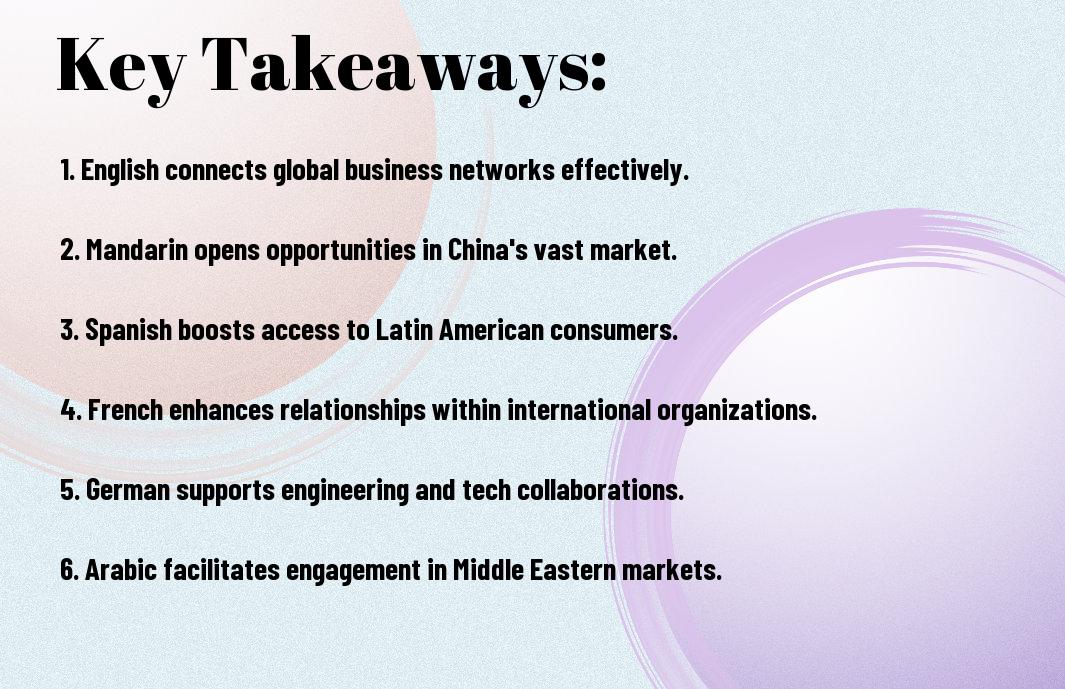As you expand your business globally, you’ll encounter diverse markets and clients. To effectively communicate with your target audience, you need to speak their language. You can gain a competitive edge by learning languages that open doors to new markets and customers. Your language skills will enhance your ability to navigate international business environments and foster strong relationships with your clients and partners, ultimately driving your business forward.

Key Takeaways:
To succeed as an entrepreneur in today’s global market, learning a new language can be highly beneficial. Here are the key points to consider:
- Learning Mandarin Chinese can give entrepreneurs a competitive edge, especially when doing business in Asia, due to China’s large and growing economy.
- Spanish is another valuable language for entrepreneurs, as it can open up opportunities in Latin America and the United States, allowing for expansion into new markets.
- Arabic is also a strategic language to learn, given the Middle East’s significant economic growth and the increasing importance of international trade in the region.
Choosing the Right Language
For entrepreneurs, selecting a language to learn can be a daunting task, but it’s important to consider your business goals and target market when making your decision. You’ll want to choose a language that aligns with your company’s objectives and helps you connect with your desired audience.
Language for Global Market
Linguistically, you’ll need to consider the languages spoken by your global customers, partners, and competitors, and choose one that will give you a competitive edge in the international market, allowing you to effectively communicate and expand your business worldwide.
Language for Specific Regions
About the regional languages, you should think about the areas where you want to establish or expand your business, and learn the dominant language of that region to better understand the local culture, customs, and consumer behavior.
Also, as you probe deeper into the specifics of regional languages, you’ll find that learning the local language can help you build stronger relationships with your customers, suppliers, and partners, ultimately leading to increased trust, loyalty, and business success in your target region, and you will be able to tailor your products or services to meet the unique needs of that market.

Top Languages for Entrepreneurs
Clearly, as an entrepreneur, speaking multiple languages can give you a competitive edge in the global market, allowing you to communicate with clients and customers from diverse backgrounds, and understand their needs more effectively, thus expanding your business opportunities.
English as a Global Language
Prior to exploring other languages, you should consider that English is widely spoken and widely used in international business, making it an vital language for you to learn if you want to succeed in the global market, facilitating your communication with people from different countries.
Mandarin for Asian Markets
Approximately, as you consider expanding your business to Asia, you will find that Mandarin is the most spoken language in the region, making it an attractive language for you to learn, enabling you to tap into the vast and growing Asian market, and connect with potential clients and partners.
But as you investigate deeper into the benefits of learning Mandarin, you will discover that it can open doors to new business opportunities, allowing you to navigate the complex Asian market with ease, understand the local culture, and build strong relationships with your Chinese counterparts, ultimately giving you a competitive advantage in the region and helping you to grow your business successfully.
Language of Business
Keep in mind that speaking the language of your target market can greatly benefit your business. As an entrepreneur, you need to understand your customers and communicate effectively with them. Your language skills can make or break your business deals, and being proficient in the right language can give you a competitive edge.
Spanish for Latin America
Similarly, Spanish is a vital language for entrepreneurs looking to expand into Latin America. You will be able to connect with over 400 million native speakers, opening up new markets and opportunities for your business. Your ability to speak Spanish will allow you to navigate the cultural and linguistic nuances of the region.
Arabic for Middle Eastern Markets
Behind the success of many international businesses lies the ability to communicate in Arabic. You can tap into the rapidly growing markets of the Middle East by learning Arabic, which will give you access to a vast and lucrative region. Your Arabic language skills will enable you to build strong relationships with your clients and partners.
Plus, as you research deeper into the Arabic language, you will discover a rich cultural heritage and history. You will be able to understand the nuances of the Middle Eastern market, including the importance of building trust and relationships. Your ability to speak Arabic will demonstrate your commitment to your clients and partners, setting you apart from your competitors and giving you a unique advantage in the region.
Emerging Markets
To succeed in the global market, you need to consider emerging markets. You can expand your business by learning languages spoken in these regions, increasing your chances of success.
Portuguese for Brazil
For entrepreneurs like you, learning Portuguese can open doors to the vast Brazilian market, allowing you to connect with over 212 million people and grow your business.
Russian for Eastern Europe
With Russian, you can tap into the massive Eastern European market, gaining a competitive edge and unlocking new opportunities for your business.
Also, as you explore the Russian language, you’ll discover a wealth of cultural and economic insights, enabling you to tailor your business strategy to the unique needs of the Eastern European market, and helping you build strong relationships with your Russian-speaking clients and partners.
Language Learning Strategies
Your approach to learning a language can significantly impact your progress, and as an entrepreneur, you need to be strategic about how you allocate your time and resources to achieve your goals.
Immersion Techniques
Linguistic exposure is key to rapid language acquisition, and you can achieve this by surrounding yourself with the language you want to learn, whether through TV shows, podcasts, or speaking with native speakers.
Online Courses
Only a few online courses are designed with the entrepreneur in mind, offering flexible scheduling and focused lessons on business-related topics, allowing you to quickly gain the language skills you need to succeed.
Also, when choosing an online course, consider your learning style and goals, and look for courses that offer interactive lessons, real-life scenarios, and opportunities to practice speaking and listening, as these will help you develop a more well-rounded set of language skills that you can apply in your business endeavors, enabling you to effectively communicate with clients, partners, and colleagues from diverse linguistic backgrounds.
Industry Specific Languages
All entrepreneurs should consider learning a language that caters to their specific industry, as it can give you a competitive edge. You can explore languages that are valuable for international business by visiting Excluding English, what are the most valuable languages to learn for international business to make informed decisions.
French for International Relations
Languages like French are highly valued in international relations, as you will encounter numerous French-speaking countries and organizations, making it beneficial for your business interactions.
German for Engineering
Along with other languages, German is a popular choice for engineering and technology, as many multinational companies are based in Germany, and speaking the language can enhance your career prospects.
It is worth noting that German is an official language in several countries, and your knowledge of the language will open doors to new business opportunities and collaborations in the engineering sector, allowing you to communicate effectively with your German-speaking clients and partners.
Final Words
So, as you consider expanding your business globally, you’ll find that learning languages like Mandarin, Spanish, or Arabic can greatly enhance your entrepreneurial pursuits. You’ll be able to connect with your target audience more effectively and gain a competitive edge in the market. By investing time in learning these languages, you’ll unlock new opportunities and take your business to the next level, allowing you to achieve your goals and increase your revenue. Your language skills will be a valuable asset to your business.
FAQ
Q: What are the most beneficial languages for entrepreneurs to learn in terms of business expansion and global market reach?
A: For entrepreneurs looking to expand their business globally, learning languages such as Mandarin Chinese, Spanish, Arabic, and Portuguese can be highly beneficial. Mandarin Chinese, spoken by over a billion people, offers access to a vast and growing market. Spanish, with its widespread use in the Americas and Europe, provides a significant edge in trade and commerce. Arabic, being the official language of many Middle Eastern countries, is vital for entrepreneurs aiming to tap into the region’s booming economies. Lastly, Portuguese, spoken in both Portugal and Brazil, opens doors to lucrative markets in Europe and South America, especially considering Brazil’s large and growing economy. Mastering any of these languages can significantly enhance an entrepreneur’s ability to navigate international markets and foster global business relationships.
Q: How does learning a foreign language impact an entrepreneur’s ability to innovate and stay competitive in the global market?
A: Learning a foreign language can profoundly impact an entrepreneur’s ability to innovate and stay competitive. It allows them to access a broader range of resources, including research, technologies, and innovations that may not be available in their native language. This can lead to novel business ideas and solutions that cater to the specific needs and preferences of foreign markets. Additionally, language proficiency enables entrepreneurs to engage directly with international clients and partners, fostering deeper understanding and more effective collaboration. This can lead to better-tailored products and services that meet the demands of a global customer base, thereby enhancing competitiveness. Moreover, being able to navigate foreign markets firsthand provides entrepreneurs with valuable insights into consumer behavior, market trends, and regulatory environments, further fueling innovation and strategic decision-making.
Q: What are the most effective ways for busy entrepreneurs to learn a foreign language, given their tight schedules and demanding work commitments?
A: For busy entrepreneurs, learning a foreign language requires a strategic and efficient approach. One effective method is to utilize online language learning platforms that offer flexible, self-paced courses, allowing entrepreneurs to study at their convenience. Mobile apps, such as Duolingo, Babbel, and Rosetta Stone, are particularly popular due to their accessibility and interactive learning experiences. Another strategy is to hire a private tutor who can tailor lessons to the entrepreneur’s schedule and specific needs, potentially focusing on business-related vocabulary and scenarios. Immersive experiences, such as short trips abroad or participation in language exchange programs, can also be highly effective, though they may require more time commitment. Lastly, incorporating language learning into daily routines, such as listening to podcasts or watching foreign-language content during commutes, can provide consistent exposure and practice without significantly impacting a busy schedule.



